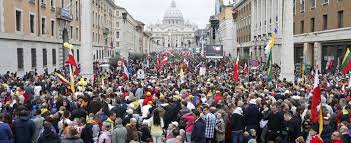Comment: City under papal pressure

ROME-The Vatican has for centuries welcomed a constant influx of visitors, no matter how high the seasonal peaks in summer months and around major holidays. Yet soon after Pope Francis put the double canonisation ceremony into this year’s schedule, it became clear this unprecedented event would be a challenge the Italian authorities had rarely, if ever, had to deal with before.
Waves of pilgrims flooding the streets of Italy’s capital is an image its inhabitants are well used to, but as estimates of people attending the celebratory mass on April 27 grew to some seven million, expectations of further disruptions to the functioning of the city and fear of possible chaos saw many people cancelling their Roman holiday reservations, much to hotel owners’ dismay. What means a change of vacation plans for tourists, however, is no longer a minor nuisance for those living and working in Rome on a daily basis.
Malfunctioning public transport and traffic paralysed by hundreds of coaches driving pilgrims into Vatican City during the canonisations weekend are just some of the issues which raise questions as to the purpose of organising an event whose scale puts such a strain on the city, at the same time making it practically unliveable to its residents. The spiritual significance of the act of sanctifying two widely popular popes for millions of believers is indisputable, and drawing the world’s attention to two personalities known for their contribution to world peace and humanitarian aid is a noble cause in itself. But the reality of any such celebration means to preserve its global impact and wide accessibility, its organisation consumes a budget which could easily be spent on a number of pressing matters, including the very causes so fervently advocated by the two newly-sanctified.
Rome recently saw another outburst of protests in response to a mass forced eviction which left some 350 squatter families homeless overnight - just one example of how severely record-high unemployment has already affected those living in the capital. Pope Francis’s message of moderation and his emphasis on helping the poor immediately gained him extraordinary popularity, and already early on commentators saw him as a pope ‘right for his time’, right for the time of recession. His decision to raise John Paul II and John XXIII to sainthood in a ceremony yet unseen by Christendom was undoubtedly a deliberate choice, and perhaps the benefits will outweigh all temporary shortcomings. Whether mass ceremonies costing millions of euros still have a place in the world struggling with economic crisis is, however, a question which needs an answer, and the pope, who has already proven himself a visionary and an innovator, could be the one to provide it.


